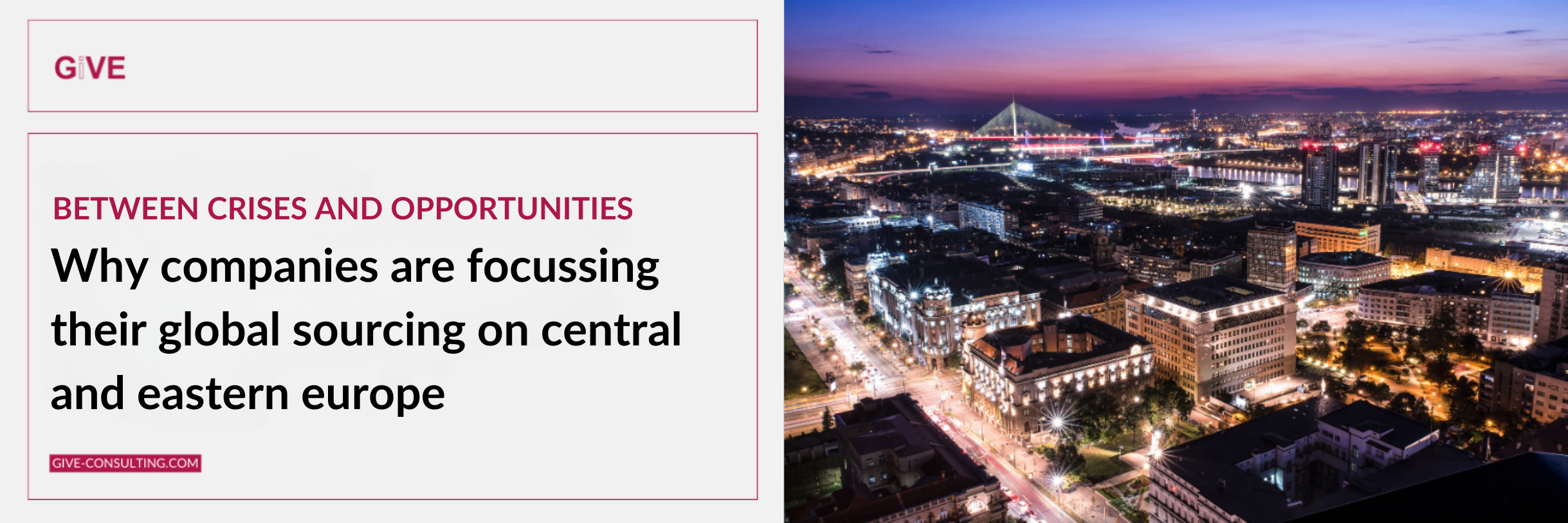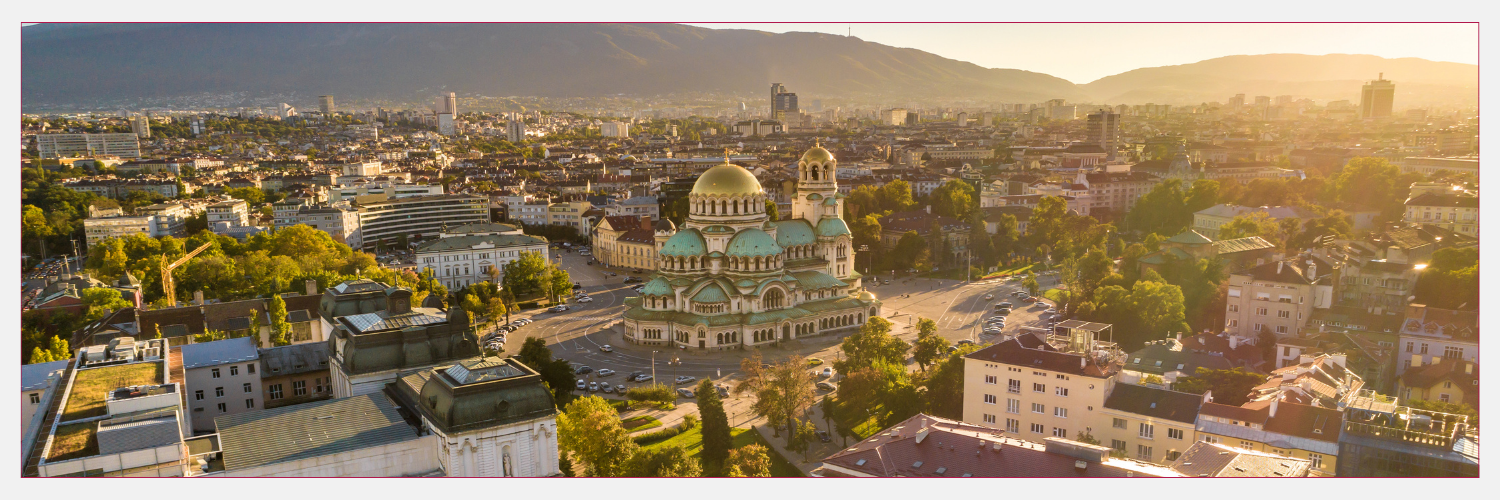
Bildnachweis: PhotoMIX-Company für Pixabay (via Canva pro)
Nearshoring instead of global sourcing: focus on Central and Eastern Europe (CEE)
In the face of global challenges such as pandemics, wars, geopolitical uncertainties and the climate crisis, companies are increasingly looking for solutions to make their supply chains more resilient. Nearshoring forms the basis for responding more flexibly to market requirements. Central and Eastern Europe are also increasingly coming into focus, but it is not just geographical aspects that speak in favour of this. This analysis highlights the complex aspects in favour of a global sourcing focus on Central and Eastern Europe.
From technologies to textiles: Central and Eastern Europe as a location for global sourcing
Central and Eastern Europe has developed into an attractive location for global sourcing in recent years. Companies from all over the world use the region to source high-quality products at competitive prices. Some of the most relevant product groups sourced from this region include
- Automotive components and accessories: CEE is known for its strong automotive industry. High-quality components such as engine parts, gearboxes and electronic systems are produced here and exported worldwide. German car manufacturers source most of their components from this region, especially from the Czech Republic.
- The electrical engineering sector is one of the key industries in which Central and Eastern Europe can capitalise on their competitive advantages. Companies such as Foxconn in the Czech Republic, ABB in Poland and Samsung in Slovakia have production facilities here.
- Mechanical engineering: The region has a strong tradition in mechanical engineering. Companies can find a wide range of industrial plants, machine tools and precision equipment here.
- Textiles and clothing: after China and Bangladesh, Germany imports most of its textiles and clothing from Turkey.
The key players in Central and Eastern Europe: Important countries and why they are in focus
There are several countries in Central and Eastern Europe that are particularly interesting due to their economic strength, infrastructure and strategic location. Here are some of the most important countries in CEE and the reasons for their outstanding importance:
Poland:
- Economic strength: Poland is the largest economy in Central and Eastern Europe. The country has developed into an important production centre in recent years, particularly in the mechanical engineering, electrical engineering and automotive industries.
- Population size and skilled labour: With a large and well-educated population, Poland has a significant workforce that is attractive to many companies.
Czech Republic:
- Industrial focus: The Czech Republic has established itself as a leading country in the field of mechanical engineering. Czech industry is known for its high-quality products, particularly in the automotive and mechanical engineering sectors.
- Stable economy: The Czech Republic has a stable economy and a favourable geographical location in the centre of Europe, which makes it an attractive hub for companies.
Hungary:
- Central location: Hungary is in a central location in Europe, making the country an important logistics hub. This contributes to the country's attractiveness for companies seeking an efficient supply chain.
- Language skills: Foreign language teaching is strongly encouraged in Hungary, with young pupils learning English or German as early as primary school.
Slovakia:
- Automotive industry: Slovakia has developed into an important centre for automotive production, with a large number of international car manufacturers maintaining production facilities in the country.
- Favourable tax environment: Slovakia offers a business-friendly tax environment, which makes it an attractive investment location.
Romania:
- Growth in the IT sector: Romania is experiencing strong growth in the IT sector and has become an important location for outsourcing services. The availability of qualified IT specialists makes the country attractive for technology companies.
These countries not only have their respective strengths in certain economic sectors, but also a favourable geographical location that favours trade and logistics. Companies in these countries are often looking for cost-efficient production facilities, a well-trained labour pool and a stable economic environment.

Turkey as a bridge between continents: Its role in Central and Eastern Europe
Turkey, although geographically partly located in the Middle East, plays an important role in Central and Eastern Europe due to its unique position as a bridge between Europe and Asia. Here are some reasons why Turkey is relevant in this context:
Geopolitical situation:
Turkey is located at the crossroads of Europe and Asia, making it an important hub for trade and logistics. This strategic location enables Turkey to act as a link between the markets of the Middle East and Europe.
Logistical significance:
With well-developed transport infrastructure, including ports, roads and airports, the Eurasian country is a logistics centre. Companies use this infrastructure to transport their goods efficiently between the regions.
Production facility and exporter:
Turkey has developed into an important manufacturing centre, particularly in sectors such as textiles, clothing, electronics and automotive. Its manufacturing industry attracts international investment and Turkish products are competitive in global markets.
Textile and clothing sector:
For Germany, the country on the Bosporus is the most important supplier of textiles and clothing after China and Bangladesh. The Turkish textile industry is characterised by its diversity, quality and flexibility.
Economic diversity:
Turkey has a broad economic diversity and is active in various sectors. This includes mechanical engineering, food production, the chemical industry and tourism, which contributes to a stable and diversified economy.
Overall, Turkey acts as a dynamic force in the economic landscape of CEE. The country's geopolitical position makes it an important player in the region, building bridges between different continents and markets.

Economic considerations in the location decision
The selection of a suitable production location is a complex decision for companies that is characterised by various economic considerations. In the following, we take a look at the various aspects that motivate companies to favour production facilities in Central and Eastern European countries:
Labour costs:
One of the main reasons why many companies choose production sites in CEE is the lower labour costs compared to Germany. The wage differences can be significant and allow companies to optimise their production costs.
Operating costs:
General operating costs, including rents, energy costs and property prices, tend to be lower in many CEE countries compared to Germany. This contributes to the overall profitability of business activities.
Taxes and duties:
Tax frameworks can differ significantly between countries. Some CEE countries offer companies tax incentives and lower corporate tax rates, which contributes to an attractive business environment.
Infrastructure investments:
Some CEE countries have made considerable investments in their infrastructures in order to increase their attractiveness for companies. Modern transport routes and communication networks can increase efficiency and reduce logistics costs.
Currency risks:
Currency risks are an important factor in cost development. Only some of the CEE countries have adopted the euro (Estonia, Croatia, Latvia, Lithuania, Slovakia, Slovenia) or are planning to do so in the near future (Bulgaria, 2025). Other currencies can be more volatile, as a look at Turkey illustrates. This can bring both advantages and risks for export-orientated companies.
Skilled labour and qualifications:
CEE countries have a pool of highly skilled labour, particularly in areas such as engineering, IT and research. This can increase productivity and reduce the cost of training labour.
It is important to emphasise that cost trends can vary depending on the sector, region and company. While CEE countries are often considered attractive locations due to their lower costs, companies must also consider other factors such as political stability, legal frameworks and market access, especially in the region's non-EU countries. Carefully analysing the overall costs and business environment is crucial to making informed decisions.
Central and Eastern Europe as a global sourcing hub: a region in transition
The last few years have made Central and Eastern Europe a sought-after location for global sourcing. Companies worldwide value the region for its ability to deliver high-quality products at competitive prices. This trend is reflected in various key sectors, from the automotive industry, electrical engineering and mechanical engineering to textiles and clothing.
Poland, the Czech Republic, Hungary, Slovakia and Romania are outstanding players that stand out due to their economic strength, industrial focus, central location and investment-friendly environments. Each of these countries has its own strengths and attracts companies due to various factors.
In this context, Turkey plays a unique role as a bridge between Europe and Asia. With its geopolitical location, Turkey acts as an important production centre and exporter, particularly in the textile and clothing industry.
The decision to locate production in CEE is not solely based on low labour costs. Operating costs, tax conditions, infrastructure investments, low currency risks in the euro countries and the availability of highly qualified skilled labour also speak in favour. A comprehensive analysis of these factors is crucial, as cost trends vary depending on the industry, region and company.
In addition, companies must take political stability, legal framework conditions and market access into account when making long-term and sustainable business decisions.



